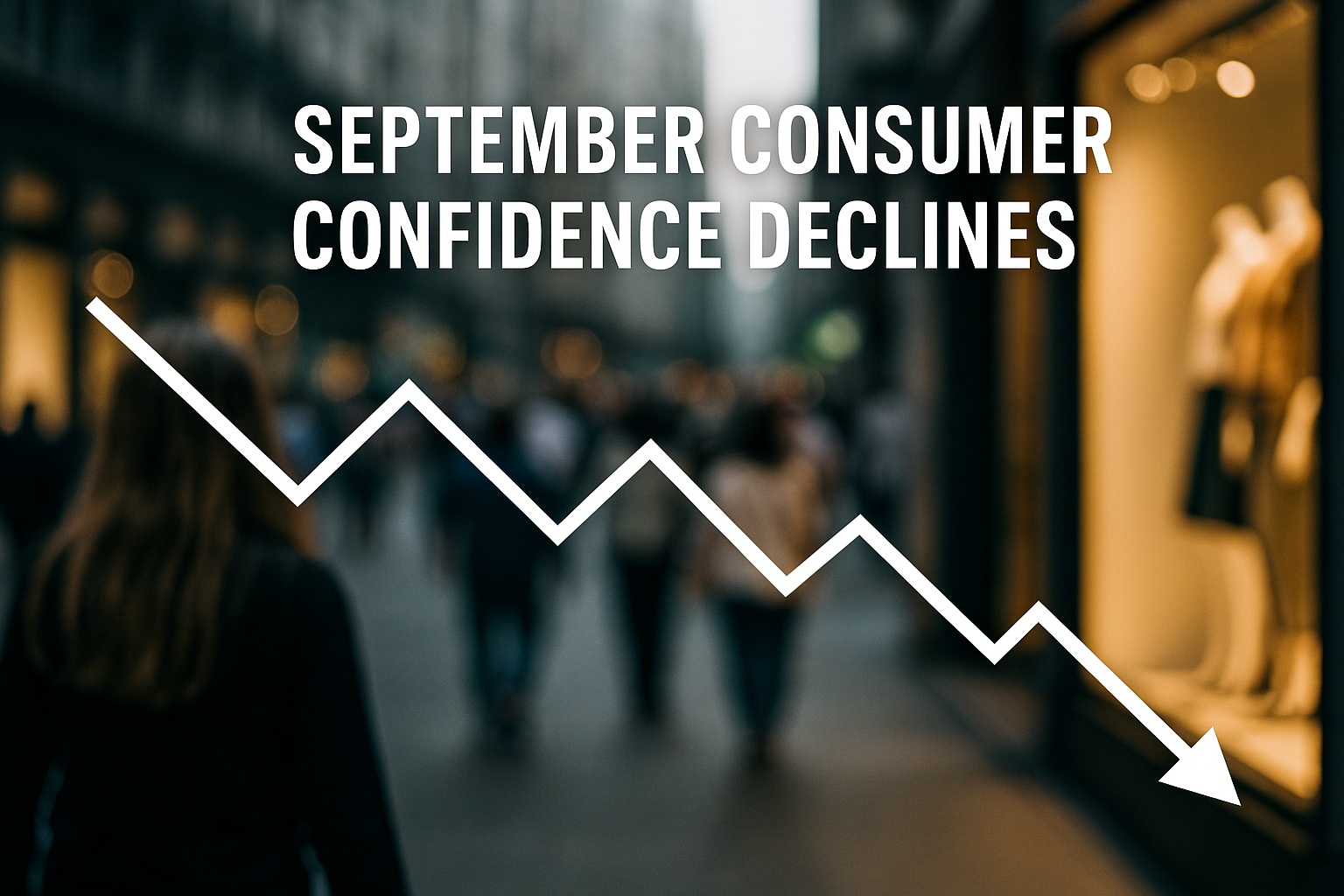U.S. consumer confidence fell sharply in September 2025, reaching its lowest level in five months. Americans are feeling less optimistic about business conditions, job prospects, and inflation. This shift could affect spending and economic growth as the year closes.
Consumer Confidence Falls to a Five-Month Low
The Consumer Confidence Index dropped to 94.2 in September from 97.8 in August — a clear sign that Americans are feeling uneasy about the economy.
Two key parts of the index fell:
- The Present Situation Index, which measures how people feel about current conditions, dropped by 7 points to 125.4.
- The Expectations Index, which tracks outlook for income, jobs, and business conditions, slipped to 73.4.
Notably, the Expectations Index has stayed below 80 since February — a level that often signals concerns about a possible recession.
What’s Behind the Decline
1. Worsening Views of Business and Jobs
Fewer Americans described current business conditions as “good,” while more called them “bad.”
The share of people who said jobs are plentiful also fell — from 30.2% in August to 26.9% in September.
2. Inflation Still a Major Concern
Inflation remains a key worry. Many survey respondents mentioned rising prices as their top concern.
Even though overall confidence dropped, expectations for inflation over the next 12 months eased slightly — from 6.1% to 5.8%.
3. Sentiment Varies by Age and Income
- Confidence rose slightly among Americans under 35, but declined among those over 35.
- Across income levels, the changes were mixed. Only households earning between $25,000–$35,000 and those above $200,000 reported confidence lower than earlier in the year.
What This Means for the Economy
Consumers May Spend Less
When confidence drops, people often delay or cut back on major purchases. Analysts are already seeing weaker interest in big-ticket items like cars and services such as travel.
If this continues, it could slow growth in the retail and hospitality sectors during the holiday season.
Job Market Jitters
Fewer consumers believe jobs will remain easy to find. If hiring slows or layoffs rise, confidence could fall even further.
Recent surveys show that more people now expect higher unemployment in the coming months.
A Challenge for the Federal Reserve
The Federal Reserve faces a balancing act: keeping inflation under control while avoiding an economic slowdown.
If confidence keeps slipping, policymakers may face pressure to support growth — though still-high inflation could limit their options.
Recession Risks Still Linger
Since early 2025, the Expectations Index has stayed below the recession-warning level of 80.
This suggests that many households remain cautious about the economy’s direction, even as inflation begins to cool.
Key Takeaways
- Consumer confidence dropped to 94.2 in September — the weakest reading since April 2025.
- Americans are less positive about jobs and business conditions.
- Inflation continues to weigh on sentiment, even as price pressures ease slightly.
- Confidence is lowest among older and middle-income groups.
- If the trend continues, consumer spending could slow and increase economic headwinds going into late 2025.
Quick FAQ
Q: Why did consumer confidence fall in September?
Mainly because of concerns about the job market and stubborn inflation.
Q: Is a recession likely?
Not guaranteed, but continued weakness in consumer confidence often signals slower growth ahead.
Q: How will this affect businesses?
Companies may see softer demand for non-essential goods and services. Some may adjust prices, promotions, or hiring plans accordingly.
Sources
- The Conference Board – September 2025 Consumer Confidence Index Report
- PR Newswire – “U.S. Consumer Confidence Declines Again in September”
- FedPrimeRate – Conference Board Consumer Confidence Index Summary (September 2025)
- RTTNews – “U.S. Consumer Confidence Index Falls to Five-Month Low in September”
- PBS / Associated Press – “U.S. Consumer Confidence Declines Again as Americans Worry About Inflation, Job Market”
- Investopedia – “Consumer Confidence Drops as Concerns About Job Market Rise”

